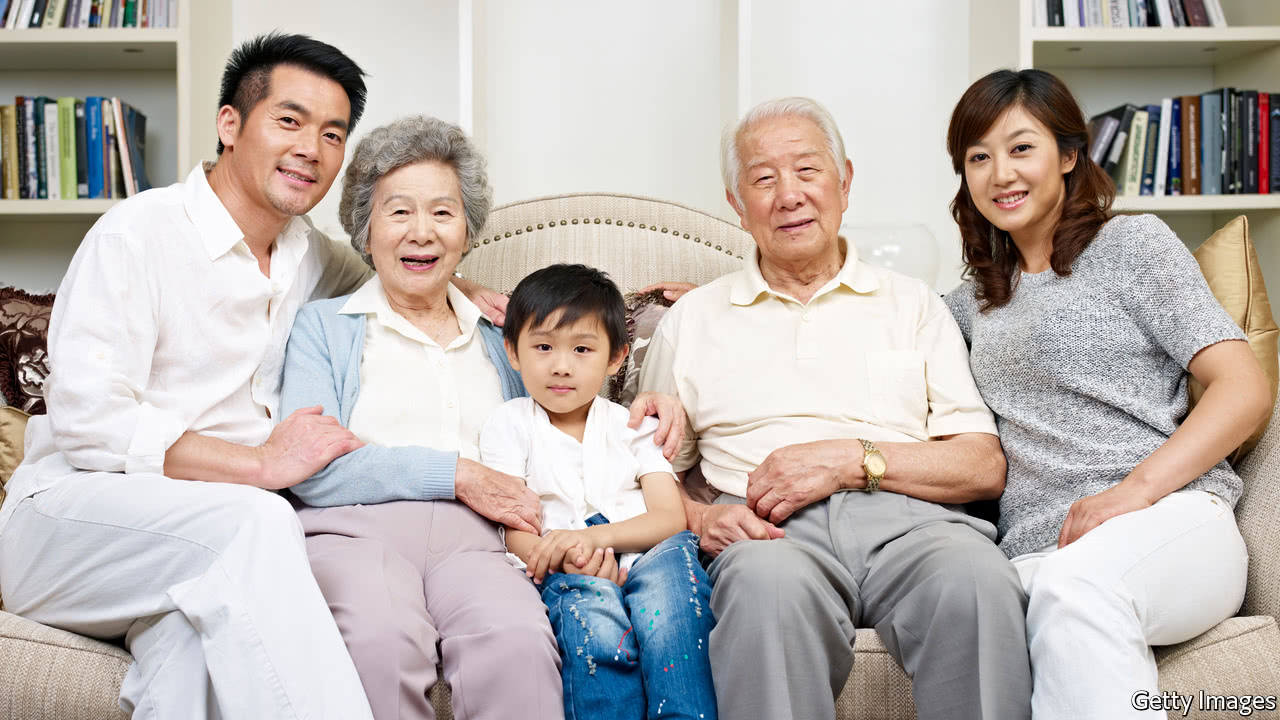
DESPITE her father’s pleas, Cherry Liu refused to work for the family business, a small electronic-components company founded in 1979 on the outskirts of Taipei. A 34-year-old diamond dealer based in Sydney, Ms Liu says she is simply not passionate about gadgets such as circuit-breakers. Nor are her siblings. Her 64-year-old father cannot find a successor, but he will not even consider recruiting someone outside the family, she says. He fears that a newcomer might leave and take the family’s precious list of customers and suppliers with him.
Taiwan’s economic boom was fuelled by people like Ms Liu’s father, entrepreneurs who started from nothing to build successful family-run companies, many of which are now huge. These firms still dominate Taiwan’s export-reliant economy, which specialises in high tech. Of all listed firms, 70% are family-run, compared with 33% for Chinese firms and 40% for Hong Kong-based ones. Almost three-quarters of family concerns are operated by their original founders, according to a report in 2017 by the Taiwan Institute of Directors.
-
Retail sales, producer prices, wages and exchange rates
-
Foreign reserves
-
Why commodity prices are surging
-
Why a judge’s injunction on DACA is unlikely to stand
-
Teenagers are becoming much lonelier
-
The Supreme Court considers the scope of automobile privacy
A succession crisis is likely to be the eventual result. Taiwanese business is run by the very oldest chief executives in the Chinese-speaking world, notes Allen Tsai of the Institute of Directors; the average age of a Taiwanese boss of a (listed) company is 62, compared with 47 for Chinese ones. These founders (and those of unlisted firms, too) usually eschew outsiders; their children are often uninterested. Only 9% of firms have written succession plans, according to PricewaterhouseCoopers Taiwan; the global average is 15%.
Foxconn, the world’s largest contract electronics manufacturer and one of Taiwan’s best-known firms, is among the firms dogged by speculation about succession. Its founder, Terry Gou, is 67; about a decade ago he enlisted the help of academics to develop succession plans for senior executives in different divisions and subsidiaries. Mr Gou was initially interested in finding a successor for himself, says Tang Ming-je of National Taiwan University, who took part, but later dropped the idea.
Mr Gou’s children have expressed no interest in taking over the business, although one of his sons, Gou Shou-cheng, discreetly involves himself in Foxconn deals. He runs a company that operates an electronics shopping mall in Taipei, and heads charities, all owned by his father’s company. But he keeps such a low profile that one analyst who monitors Foxconn was unaware of his role. Other large firms facing succession dilemmas include Quanta Computer and Tatung, a conglomerate.
Succession is not the only problem. President Tsai Ing-wen has called for the country’s companies to innovate, urging Taiwanese manufacturers to update their long-established pattern of taking orders from branded Western companies to make gadgets like computers and smartphones. Her government is trying to encourage new fields, including smart machinery, green energy and biotech. That may jar with the instincts of family-run firms. Wei Tsung-che, an economist with the semi-official Chung-Hua Institution for Economic Research, noted in a recent study that companies with ageing bosses often plan only for the short term, rely too much on their past experience and are reluctant to make bold, disruptive changes.
Their children, often educated abroad, could be potential disrupters if they want to work in the family firm. But they often find that their knowledge of current consumer preferences, from social-media platforms to apps, are ignored because their parents have the last word on strategy.
When the next generation is both keen to get involved and listened to, Taiwanese family custom can still send plans awry. In Japanese family-run firms one successor tends to be named, whether someone from the dynasty or an adult employee who is “adopted”. The usual practice in Taiwan, by contrast, is to divide up the company between all the children.
Sometimes sibling rivalry gets out of hand. Evergreen Group, which owns EVA Airways, one of Taiwan’s two big carriers alongside China Airlines, has suffered chaotic management ever since its founder, Chang Yung-fa, died in 2016. He had named Chang Kuo-wei, his fourth son by his second wife (formerly his mistress), as his successor and main heir. As his will was not legally watertight, his three half-brothers staged a boardroom coup and ousted Mr Chang as chairman, sending shares in listed subsidiaries of Evergreen Group southward. Now Mr Chang is getting his revenge by planning the launch of a rival third Taiwanese international carrier, called StarLux, in 2019.
Source: economist
Taiwanese bosses are the Chinese-speaking world’s oldest